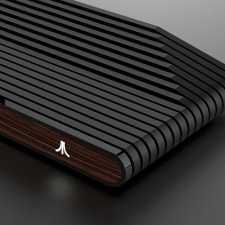Steam Machines, Ouya, GameStick, MOJO – the ‘PC under the TV’ club is not an exclusive one, but one theme unites all its members: none of them were a sales success.
The idea that Atari will prosper where so many others have failed has resulted in a fair few scoffs, but speaking to former Xbox exec Ed Fries on behalf of VentureBeat, Atari general manager Feargal Mac argued that Atari’s approach genuinely does differ.
“Steam, Valve, an amazing company, but I think—when you give away too much of the experience, just write a standard and let multiple other companies build boxes, you get into trouble there,” Mac stated. “We want to be super open, but we also want to deliver an integrated experience for the customers that buy our box…
"The thing with Steam was you had so many people building the boxes at different prices and structures. It’s cumbersome to do that in a unified way.
“We want to own this box. The design is something we spent a lot of time on, making it just right… The Steam thing — it’s just a different positioning. You can stream and do other things on Ataribox as well. We want it to be a device that, in the living room, is entertainment. It’s gaming, but it’s more than gaming.”
Speaking of Ouya specifically, Mac argued that his device’s use of Linux (like Steam Machines), as opposed to the Android OS used in a lot of micro-consoles, is a key factor.
“Linux is important. As an operating system, from a technology and a collaborative point of view, it’s possibly one of the greatest technological achievements of mankind,” Mac enthused. “One of the things we’ve done by adopting Linux, it lets us bring insanely great PC gaming to the TV.
“With Ouya and some of the Android-based systems—it’s about context. Android, the kernel is Linux, but it’s like ripping the engine from a Lamborghini and putting it in a Ford Focus. There’s a lot of power under the hood you don’t get to. We didn’t want to go the Android route for that reason. We wanted to open up the way to a really open system where all these great indie developers could bring great content to the TV in a super easy way. Linux lets you do that.
"It would have been easy to create a super cheap Android-based device, but that’s not what we wanted to do. This is different. This is open.”
Mac also addressed the criticism that modern Atari in actuality has little to do with the company of the past.
“I hear people say, ‘Oh, it’s not Atari anymore.’ Well, yeah, it is,” Mac insisted. “It’s changed hands, but so has Apple over the last 25 years. There are people walking around the halls of Atari that have been there 20-plus years, through all of these iterations. More than the ownership or the location or any employees — as a brand, a company stays alive because people love that brand. That hasn’t broken with Atari. When I look at it as a company, it’s still Atari.
“What it is today, it’s evolving. It’s had a great three or four years. It’s come from the brink of the abyss… It’s going to be a great business case study in a few years, where you can see they’ve come from debt and a bad situation, growing their revenues year on year, working on the brand merchandising…. It’s still a company. It’s always been a company. It’s made a great comeback.”













